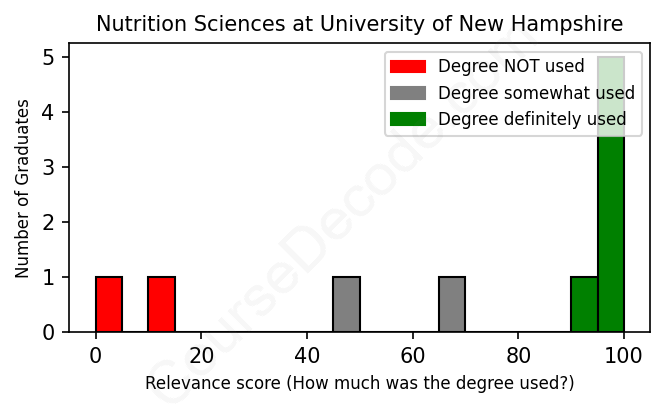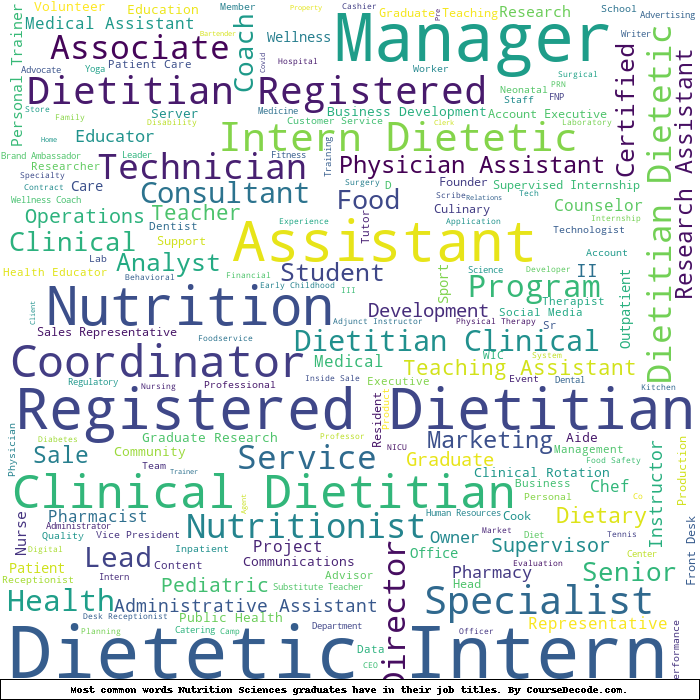
First, some facts. Of the Nutrition Sciences graduates from University of New Hampshire we've analyzed , here's how many have used (or NOT used) their degree in their career:

These are estimates based on AI analysis of 10 LinkedIn profiles (see below).
The verdict? Slightly above average. Overall, with an average relevance score of 71%, Nutrition Sciences graduates from University of New Hampshire have a slightly higher likelihood (+4%) of finding work in this field compared to the average graduate across all fields:
And for comparison, here's the chart for all profiles we've looked at across all degrees.
Also, after graduating, 40% of these graduates have pursued further education other than another Bachelor's degree (such as a Masters degree or other), compared to the average across all profiles of 35%. This suggests you may need more than just a Bachelors degree to be competitive as a Nutrition Sciences graduate.
See the details:
|
Relevance score: 100% We think this person has gone into a career highly relevant to their degree. We think this person has gone into a career highly relevant to their degree.
DEGREE INFOGraduated in 2015 from University of New Hampshire with a Bachelor's degree in Nutrition Sciences. No other secondary education since. JOB HISTORY SINCE GRADUATIONDietetic Intern Brigham and Women's Hospital Aug 2015 - Jul 2016 Registered Dietitian  Avery Manor Jul 2016 - Jul 2017 Registered Dietitian  Healthcare Services Group, Inc Jun 2017 - Jun 2019 Registered Dietitian  Southern New Hampshire Health Jun 2019 - Present ABOUTAfter graduating summa cum laude in three years from a four-year program at the University of New Hampshire, I completed my Dietetic Internship at Brigham and Women's Hospital in Boston, MA. I am a caring, compassionate, and personable dietitian and I focus on building relationships with my clients to facilitate lasting changes. |
The top 10 most common jobs done by the graduates we've analyzed (ranked most common to least) are:
It seems like most of the folks who graduated with a Nutrition Sciences degree from the University of New Hampshire ended up in roles that are pretty hit-or-miss when it comes to utilizing their specific education. A significant number of graduates secured roles as Registered Dietitians or Dietetic Interns, which are solid matches since they entail directly applying nutrition knowledge and skills in clinical settings. Besides these, we also see a few who took up internships or positions related to public health, food service management, and sports nutrition, where they could still touch on some aspects of nutrition, but often didn’t dive deep into the core competencies expected from a Nutrition Sciences degree. This shows a mix of both relevant and less relevant career paths post-graduation.
But on the flip side, there’s a fair share of graduates who ventured into roles that have little to do with nutrition. Positions like Administrative Assistant, Communications Specialist, and Service Technician don't really tap into the specialized knowledge you’d expect to find in nutrition-related job roles. So overall, while some graduates found jobs directly aligned with their degree, others ended up in roles that didn't quite leverage their expertise, indicating a range of applicability in the job market after studying Nutrition Sciences. It’s a classic case of how education can sometimes take you in unexpected directions!
Here is a visual representation of the most common words in job titles for Nutrition Sciences graduates (this is across all Nutrition Sciences graduates we've analyzed, not just those who went to University of New Hampshire):

When looking at the career paths of graduates from the University of New Hampshire who studied Nutrition Sciences, it's clear that many of them quickly found their footing in the field shortly after graduation. Many early positions involve internships or entry-level roles that are quite relevant to nutrition and dietetics. For example, graduates often start as dietetic interns or in related health roles like clinical dietitians, which shows that they are leveraging their education right away. It seems like the ones who graduated around 2015 to 2018 have really honed in on their nutrition skills with positions like Registered Dietitian and clinical roles following their internships. This indicates a nice trajectory into solid careers directly tied to their degree.
As we look further down the line, say 5 to 10 years after graduation, many graduates have maintained roles that are still closely aligned with nutrition sciences, including positions as Registered Dietitians or in health and wellness coaching. However, it’s also important to note that there are a few who have branched out into areas like public health or communications, which may not seem directly related to their major. For instance, one graduated and is now working as a Communications Specialist for USAID. While some have veered off the nutrition path, a majority appear to be thriving in roles that capitalize on their education. Overall, it does look like UNH graduates are finding good positions related to their studies, particularly in nutrition and health, with a fair amount staying on track in their field as they gain more experience over the years.
Getting a Bachelor’s degree in Nutrition Sciences, whether at the University of New Hampshire or somewhere else, can be pretty challenging but manageable if you're motivated and organized. You’ll dive into a mix of science courses like biology, chemistry, and anatomy, plus classes that focus on nutrition concepts and food systems. It requires a good amount of studying and understanding complex material, so it’s not a walk in the park. That said, if you enjoy learning about how food impacts health and are willing to put in the effort, it can be a rewarding experience. Overall, it's definitely a bit tougher than some more general degrees, but with the right mindset, you can totally handle it!
Most commonly, in the LinkedIn profiles we've looked at, it takes people 4 years to finish a Bachelor degree in Nutrition Sciences.
Looking at the paths these Nutrition Sciences graduates took after leaving the University of New Hampshire, it seems like some have landed pretty decent jobs, while others might be still figuring things out. The 2015 grad, for example, worked his way up from a dietetic intern to a registered dietitian, which usually pays pretty well in healthcare. In contrast, the 2013 grad stuck with administrative roles that probably don't pay much more than an entry-level salary. The 2020 and 2022 grads show promising starts, with roles in nursing and engineering that can earn good money as they gain experience. Overall, while some have definitely made decent money in their careers, others are still at the earlier stages, likely earning less while they build their experience and climb the salary ladder.
Here is a visual representation of the most common words seen in the "about" section of LinkedIn profiles who have a Bachelor degree in Nutrition Sciences (this is across all Nutrition Sciences graduates we've analyzed, not just those who went to University of New Hampshire). This may or may not be useful:

Here are all colleges offering a Bachelor degree in Nutrition Sciences (ordered by the average relevance score of their Nutrition Sciences graduates, best to worst) where we have analyzed at least 10 of their graduates:
| College | Score | Count |
|---|---|---|
 University of Connecticut University of Connecticut
|
85 | 11 |
 Penn State University Penn State University
|
76 | 13 |
 California Polytechnic State University-San Luis Obispo California Polytechnic State University-San Luis Obispo
|
75 | 12 |
 University of New Hampshire University of New Hampshire
|
71 | 10 |
 Arizona State University Arizona State University
|
70 | 12 |
 Texas A&M University Texas A&M University
|
70 | 19 |
 The University of Texas at Austin The University of Texas at Austin
|
60 | 21 |
 Montclair State University Montclair State University
|
59 | 10 |
 Kaplan University Kaplan University
|
54 | 12 |
 University of Arizona University of Arizona
|
46 | 20 |